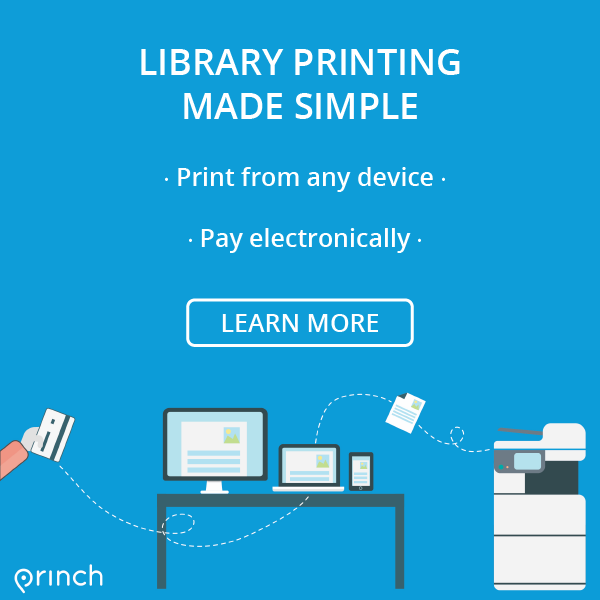On this week’s Princh Library Blog post we have guest writer Barbara Band, independent library consultant, sharing her thoughts on training up librarians – and whether training is really necessary.
Learn the key aspects of Princh! Watch our on-demand demos at your convenience and see what makes Princh such a simple solution. Watch our demos here.
Is training imperative?
Most people need some sort of basic training when they begin a new job. Librarian qualifications tend to be quite generic and even if you’ve moved from a position at another library there will be things about the new one that you need to learn; for example, while Library Management Systems all do much the same thing, each one operates slightly differently. But once you’ve had the basic training to get you up-to-speed, is there a need for further training and continuing professional development (CPD)?
The world in which we work has changed enormously over the past few decades and continues to do so. I was very proud of the single computer and basic LMS in my first school library; now we have biometrics, data stored on the Cloud, an LMS that can be accessed from your phone and a wealth of online resources available 24/7. Libraries have evolved alongside these changes to reflect the needs and priorities of the community they work with that, in turn, are impacted by the economic and political climate they exist in – be that a school, university, local town or commercial enterprise – and if we are to continue to provide relevant and up-to-date resources and services we have to maintain our skills and expertise. This doesn’t happen magically or by osmosis; it requires a dedication to CPD and an acknowledgement by management that training is not only necessary but essential for library staff.
For any organisation to be effective, staff need to be skilled and competent. Technology is now vital to the role with new platforms, applications and trends emerging regularly. As well as using these in service delivery, they need to be employed in the marketing of your service as well as the advocacy of the profession; in order to battle against the stereotypical image of libraries and librarians we should be embracing the new and developing the staff of the future. For those working in education, our students – Gen Z and Gen Alpha who have never known a world without technology – may well already be using these applications and thus presenting us with complex requests and information requirements. We cannot hope to meet them on familiar ground if we have no idea what they’re talking about.
Professional development
What are the benefits of training and CPD?
Increased motivation – a motivated workforce will usually be happier, and work more productively and efficiently.
Increased confidence – a trained workforce will have confidence in their ability to work more flexibly and respond to unexpected demands. Additionally, knowledgeable staff will increase the confidence of patrons and is more likely to result in return visits and further use of services.
Rewards – training can be a way of recognising people’s skills and potential.
Career development – targeted training can help staff to gain further responsibility and assist in their career progression.
Team development –training as a whole team can influence the dynamics of the group, facilitating collaboration, and enabling them to support each other and face challenges together.
Networking – for librarians working in solo positions, often the only opportunity they get to deliberate issues and exchange ideas is via training and CPD; learning directly from peers and colleagues is a valuable exercise.
Innovation – training and CPD will inform staff about new developments and research, and introduce them to emerging trends enabling them to bring innovation to their own roles.
Best practice – contact with other professionals enables staff to experience examples of best practice that can inform their own service delivery.
Remember that training and CPD can be both formal and informal. Formal training is often external and includes conferences, courses, accredited training programmes, and webinars. Informal training and CPD can take the form of forums, Twitter chats and Facebook groups. There are advantages (and disadvantages) to both but a range of approaches enables the best of both worlds. Training paid for by your organisation will probably need to be linked to its strategic goals and be dependent on budgets but personal CPD can be your choice and allow you to explore an area of interest or gain skills to enable you to transfer into a new sector. Even if formal training is not available to you, there are now many opportunities for free training and CPD. Check out the availability of MOOCs (Massive Open Online Courses), webinars provided by your professional association or union, and social media groups.
However, it is important that training and CPD is pro-active. This means it should result in:
Reflection – thinking about what you have learnt, whether it has increased your skills or knowledge, and how you can move this forward with further CPD.
Impact – considering how you will take what you have learnt forward into the workplace, whether it will make a difference to or change your working practices and how you will measure the impact of any changes.
The rewards
Competition for jobs is tough. Despite involving long and frequently unsocial hours, and often low pay and status, librarianship as a profession is still popular, and someone who has continued to maintain their proficiency via training and CPD will have an advantage. But this shouldn’t be the only reason for undertaking it. The intrinsic benefits of increasing your knowledge and expertise that enable you to perform more effectively and confidently are often reward enough.

Barbara Band
Independent library consultant and trainer
Website: www.barbaraband.com
Blog: http://barbara567band.blogspot.com/
Twitter: @bcb567
Recent posts
Green Libraries: How Sustainable Design is Shaping the Future of Public Libraries
In this week's Princh Library Blog post, recurring guest writer Sam L. Bowman discusses an ever so important topic: sustainable design and [...]
Librarians Supporting Digital Literacy in the Community
In this week's Princh Library Blog, Nina Grant covers why digital literacy is important, the variety of ways in which librarians are supporting [...]





Nice discussion about LIBRARY professionals. Send some More Articles.
Thanking you
Regards
Dr. Abhhey BAJPAI